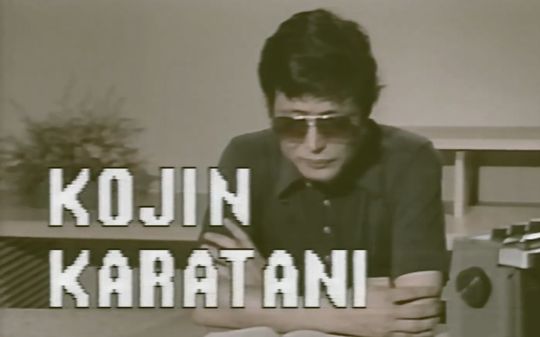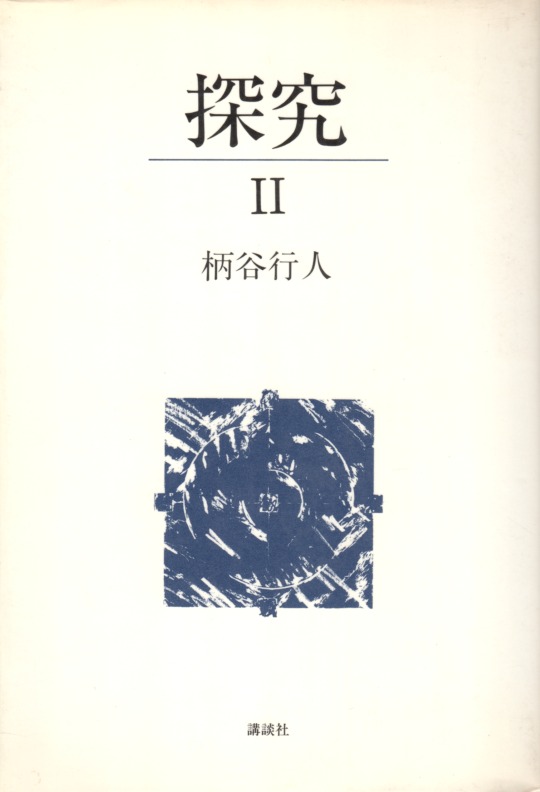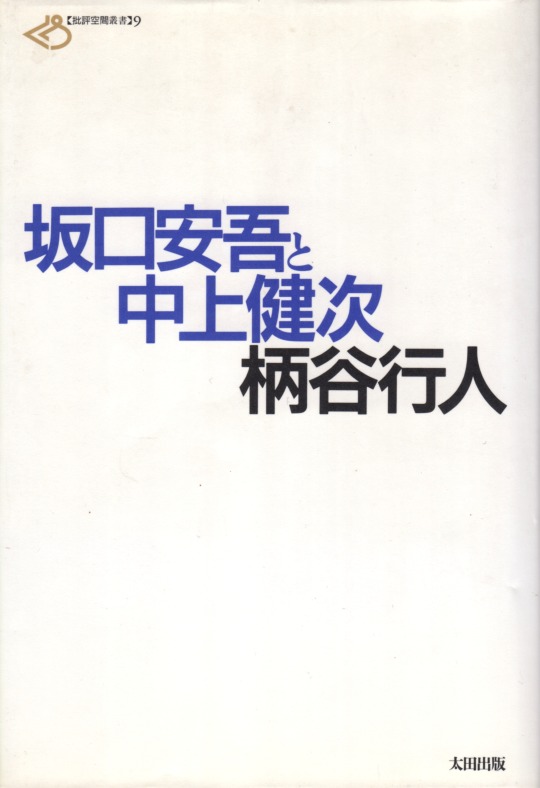#kojin karatani
Text

Philosopher Kojin Karatani, ca. 1986.
25 notes
·
View notes
Text
var olan kendisi değildir, başkaları onun varlığını devralmıştır.
heidegger - varlık ve zaman
#martin heidegger#varlık ve zaman#dasein#kitap#edebiyat#blogger#felsefe#kitaplar#blog#kitap kurdu#şiir#yabancılaşma#karl marks#rosa luxemburg#jean baudrillard#kojin karatani#bertolt brecht#dostoyevski#oğuz atay#orhan pamuk#kara kitap#bilge karasu#byung chul han#hannah arendt#ulus baker#jacques lacan#lacan'cı özne#sigmund freud#friedrich nietzsche#baruch spinoza
24 notes
·
View notes
Text

探究 2 柄谷行人
講談社
装幀=山岸義明
16 notes
·
View notes
Text
tagged by angels pits also known as @eyeofdog to post my…
last book i read: history and repetition by kojin karatani
book im currently reading: teoria widzenia by wladyslaw strzeminski, the picture of dorian gray by oscar wild and republican iraq; a study in iraqi politics since the revolution of 1958 by majid khadduri
next book: reread unequal exchange by arghiri emannuel and the theatre and its double by antonin artaud
🖤 im tagging @slavicbimbowife no one else here reads good books
5 notes
·
View notes
Text
2024/01/09 English
BGM: Sunny Day Service - 恋におちたら
It was a day off today. This morning, I went to AEON as usual, and at there I've read Nayuta Miki's book (三木那由他『言葉の風景、哲学のレンズ』) with Cornelius's great album "POINT". This book has given me plenty of clues of great philosophical ideas. This time, I've noticed this - Now, I've named myself as 踊る猫 ("throbbing disco cat".) Of course, this is not my real name, but people call me by this naturally.
In addition to that, I've chosen this pic as my icon. Therefore, in a way I can say that I've created this public image as myself, or a new chance of being born in this world to me. In other words, I can say I've started living my life newly.
Writing this… I've noticed that it is wrong. I've been already living my main life (as my real one from my true birthday, the moment I've come from my parents.) I have to say this. By naming me as that, I've started living the "alternative", or "second" life. On the internet, I can show this "alternative" life/self openly/actively. For example, I say my opinions on Facebook and X as this virtual self (not as an employee of my workplace.) In that way, I can stay in this world as a public person (a kind of cosmopolitan/netizen) as Kojin Karatani says.
Once, I had named a different name, and also given as a huge, awful image of "a gifted autistic person" to me. In that way, I had kept on declaring that I must have been a absolutely, ultimately weak person (a kind of social "victim".) It's like I had been in a mind jail. I needed to get out of there by trying to communicate with others (like Bob Dylan's song, I must have needed any friends who are watching me.)
Therefore, I have to be careful about the horrible, really strong power of "stories" or "fiction". For example, I usually come out the fact that I am autistic when I try to describe/introduce myself. But, as you can see, I have to keep on checking out if this description can cause a certain pressure toward the others. I need to be sensitive about that pressure. Yes, the real, important politic must start from this kind of tiny facts.
0 notes
Text
1 note
·
View note
Text
"The thinking of the Ionian school, which sees no separation between motion and matter, has been regarded as magical. Indeed, modern physics is built upon their separation. However, as Descartes showed, such a separation is premised on God, or else a godlike perspective. That is to say, on this point modern physics inherits an Aristotelian metaphysics or theology. Quantum mechanics decisively displaces this perspective. In some sense, it recuperates the Ionian position that matter and motion are inseparable. That is to say, the quantum (light, or the electron) is at the same time both particle (matter) and wave (motion)."
- Kojin Karatani
15 notes
·
View notes
Text
Lottery functions to introduce contingency into the magnetic power center. The point is to shake up the positions where power tends to be concentrated; entrenchment of power in administrative positions can be avoided by a sudden attack of contingency. It is only the lottery that actualizes the separation of the three powers. If universal suffrage by secret ballot, namely, parliamentary democracy, is the dictatorship of the bourgeoisie, the introduction of a lottery should be deemed the dictatorship of the proletariat.
Kojin Karatani, “Transcritique: On Kant and Marx.”
1 note
·
View note
Text
mükemmelleşme arayışımızın aslında negatif bir temeli vardır: kavrayış eksikliği.
spinoza - anlama yetisinin düzeltilmesi üzerine inceleme
#kitap#edebiyat#blogger#felsefe#kitaplar#blog#kitap kurdu#friedrich nietzsche#baruch spinoza#spinoza#karl marks#alman ideolojisi#friedrich engels#sherlock holmes#agatha christie#christopher caudwell#jean paul sartre#arthur schopenhauer#felsefe blog#sokrates#ethika#ulus baker#walter benjamin#martin heidegger#umberto eco#jorge luis borges#kojin karatani#stoic philosophy#existentialism#alain de botton
7 notes
·
View notes
Text

坂口安吾と中上健次 柄谷行人
批評空間叢書9
太田出版
装幀=東幸央
7 notes
·
View notes
Text
El proyecto crítico de Marx
¿En qué consiste el proyecto crítico de Marx? En efecto, su criticismo debe ser comprendido como inscribiéndose en la tradición abierta por Kant. Pero esta vez lo que está en juego es establecer la legitimidad —o falta de ella— de la moderna sociedad burguesa. ¿De qué modo? ¿Cuál es el método confeccionado por Marx? Se trata de una labor de crítica categorial del discurso de la economía política: por medio de este portavoz ideológico de toda una época (función filosófica por excelencia para Althusser) el capitalismo había pretendido ser algo que no era —secularización, ilustración, libertad, etc. Marx se dedica a re-ligar las categorías engañosas, mistificadas, invertifas, fetichistas, de la economía política (digamos, habría que rastrear en el espíritu de Deleuze & Guattari, un uso trascendente de las mismas) con su verdadero suelo, de donde nunca se separaron del todo.
Hay toda una dimensión ética en esta elaboración teórica, al lado de la política. ¿Es legítima la dominación capitalista?
Obras que hay que considerar: Enrique Dussel (su discusión sobre la legitimidad), Kojin Karatani (dimensión ética y sentido de lo transcrítico), Deleuze & Guattari (el retorno de lo viejo en lo nuevo), y Bolívar Echeverría.
2 notes
·
View notes
Quote
Making of 'a society that can be sustained even without economic growth' is a must. The present has become an era that cannot endure the lack of growth or change, but it is necessary to create a society that remains fine without development.
Karatani Kojin, in a new year interview with Kyunghyang Shinmun, 7 January 2013
1 note
·
View note
Text
2023/03/26 English
BGM: Prince - Batdance
At last, this diary reaches its 600th day. This morning I wrote this diary as usual. Someone had written about how learning English could work for living our life. It was interesting to read. Me, I don't learn English for TOEIC or my career (actually, I rarely use this English for my work). I just do it for the pleasure of learning itself. In addition, I learn English for supporting my mind (a Japanese famous critic, Kojin Karatani, says that learning any language would work for helping our minds). Anyway, I have never thought that learning English actually robbed my precious time or resources through my life. It says that learning English has given me various gifts certainly. Through talking with others on Discord and MeWe, I can find different pleasures from communicating with Japanese users only. It opens my eyes. Some people wants my English diary so I can feel thanksgiving for learning English.
Recently I am rarely using Twitter, but I actually look at its timeline every day. But if I post something on it, I try to keep the modesty not to be involved other people' cruel or silly tweets (at the time Abe ex-minister had been killed, I actually found some really cruel or brutal tweets). I have often lost myself by various struggles with other users, even gotten mad, and after that I felt really ashamed... nowadays I don't have any interest in gaining many followers or making "buzzing" tweets. Now I have some great real connections of the "danshu" meeting, and also the meeting about autism. On the net I have the connections of learning English or reading. They are really enough for me. I don't want to sell my name to become famous on any social media.
This afternoon, I read the tweet about esteem needs by someone on Twitter. That person said that we should control it by our ration, and I commented that it was different from my point of view. Thinking about it from my shameful past memories, the esteem needs might come from the emotion between "get too closer" and "leave it alone". In my opinion, it is similar with alcohol addiction's ambivalence. Then, we might be able to "reuse" the solution for addiction to solve that esteem needs? We shouldn't trust our ration too much to solve it. We accept the fact we are powerless, and connect ourselves to others. That ability of trusting others would work for caring that kind of addiction to others (I guess this means esteem needs).
This evening I went back to my group home. Maybe because I couldn't sleep well, I felt so sleepy (spring time is famous for Japanese people about sleepy time) that I slept in a halfway of reading Keizo Hino and Jack Kerouac with Death in Vegas's music "Dead Elvis". I am feeling that the rotation of music I am enjoying is getting firm. Before work, recently I am listening to Prince's "Batdance" to adding myself braveness (by the way, this song is popular for some Japanese because a part of this song's lyric sounds funny). And the afternoon, I enjoy various sweet soul music like Mr. Lauryn Hill. The evening I quietly enjoy Jazz or other music I once enjoyed in my 20s. I stopped following any trend, and am feeling I am losing desire... but my mind changes really easily so I might listen to King Crimson with reading Dickens or Tolstoy. Oh, this is the fear of autism.
0 notes
Text
A capitalist economy is a system of credit. Credit was adopted as a means of sidestepping fundamental difficulties inherent to commodity exchange. For this reason, there is always a danger that credit will suddenly collapse. Credit “crises” are not accidental; they are necessary and inevitable results of exchanges involving a specific commodity: labor power. This is because, while the commodification of land, money, and capital take place within a self-regulating system — albeit an imperfect one — no such self-regulation is possible for the labor-power commodity.
... there is a fatal flaw in this system, one that originates in the unique character of the labor-power commodity itself: capital can acquire raw materials as commodities, and it can use these to produce other commodities, but it cannot on its own produce the commodity of labor power. Unlike other commodities, labor power is not subject to the self-regulating system of the market. One cannot simply discard it when demand falls, nor quickly produce more if shortages occur. For example, when there is a labor shortage, one can supplement the existing supply with migrant workers from abroad, but later, when they are no longer needed, they are not easily expelled. As a result, the market “price” of labor-power constantly fluctuates according to supply and demand, and this in turn drives the profit rates of capital.
This unique feature of the labor power commodity makes boom-and-bust economic cycles unavoidable. In good times employment increases and wages soar, causing rates of profit to fall. But because favorable conditions lead to an overheating of credit, capital responds to the apparent presence of demand by expanding production. In the end, credit collapses and panic sets in. It becomes clear to all that there had been overproduction. The crisis and slump that follow weed out fragile companies unable to secure a profit. But the slump also causes wages and interest rates to decline, which in turn frees up capital to invest in new equipment and technology. Gradually this leads again to good times — and when that reaches its peak, the next crisis begins.
The accumulation of capital, or rise in the organic composition of capital, is achieved through this kind of business cycle. Capitalism has no other options besides this rather violent method. Seen in this light, it becomes clear that crises will not lead to the downfall of capitalism: they are actually an indispensable part of the process for capital accumulation. Even if crises of credit no longer arise in their classical form, this sort of boom-and-bust cycle will always haunt industrial capital. I should note that this explanation is based on the short-term business cycles that Marx encountered during his lifetime and which are distinct from long-term business cycles.
[...]
If we want to grasp the problem of economic cycles comprehensively, we have to take into consideration not only the labor-power commodity but also the commodity that is serving as the standard commodity for global capitalism [eg. wool, cotton, consumer goods]. The economic cycles that Marx analyzed were short-term fluctuations, now called Juglar cycles. In contrast to these, Nikolai Kondratiev analyzed longer-term fluctuations with a cycle of around fifty or sixty years. In addition, another kind of long-term cycle has been identified that is based in long-term price fluctuations. In my view, though, cycles in industrial capitalism should be seen as problems ultimately related to the labor-power commodity. In the long term, these appear as transformations in the primary mode of production in industrial capitalism, such as the rise of the textiles industry or heavy industry. Seen from another perspective, occurrences of long-term fluctuations corresponded to changes in the world commodity (standard commodity) — from woolen fabric to cotton textiles, then to heavy industry, durable consumer goods, and so forth. Such changes in the world commodity involve transformations in the level of technology and in modes of production and consumption, and hence cannot help but be accompanied by widespread social transformation.
For example, for as long as woolen fabric remained the world commodity, Britain could not surpass Holland. Holland enjoyed dominance in the woolen-fabric industry, and as a result, Holland also held hegemony in transit trade [merchant capital] and the financial sector [usury capital]. But when cotton textiles began to supplant wool as the world commodity, hegemony passed from Holland to Britain — though Holland long retained hegemony in the fields of trade and finance. Britain in turn began to lag behind Germany and the United States with the shift from textiles to heavy industry, though like Holland before it, Britain maintained its hegemony in the trade and finance sectors.
After the Great Depression of the 1930s, the world commodity shifted to durable consumer goods (for example, automobiles and consumer electronics). This led to the rise of the consumer society, characterized by mass production and mass consumption. It reached the saturation point in the 1970s, and globalization was the strategy adopted to escape from the severe recession that ensued. This meant the pursuit of new laborer- consumers. This was made possible [in part] by the collapse of the Soviet Union in 1991. World capitalism found new opportunities in the former socialist states and in regions that had been under these states' influence, areas that had previously been isolated from the world market. But this involved swallowing up enormous populations in such places as India and China, and as a result the various contradictions that had already surfaced were now aggravated to an explosive degree. Environmental destruction likewise reached critical levels.
Kojin Karatani, The Structure of World History
0 notes
Text
Strangely enough, at the same time as its standing on the meta-level and therefore closing the ‘relational system’ of commodity, money (qua commodity) descends, on its own accord to the object level. It is this very ‘disequilibrium’ that provides the essentially deconstructive disposition of capitalism
Like Cantor, who treated infinity as a number, Marx developed his ‘theory of sets’ by treating capital itself, and therefore money itself, as a commodity. It was thus not the generality but the infinity of money that interested Marx. Money must not be regarded as a general measure of value, but rather as a commodity that is unconditionally exchangeable.
Classical economics ignores this aspect of money by defining money as a barometer that indicates the magnitude of value. By excluding money, the classical schools of economics were able to achieve an equilibrate system. The same can be said for the neoclassical school and, for that matter, most Marxian economists. On the other hand, Marx stresses that such an equilibrium is essentially nonexistent. It is therefore absolutely impossible to control capitalism from the meta-level, because capitalism itself is deconstructive.
This does not mean that Capital can be reduced to this interpretation. What I would like to say here is that Marx was experiencing the same crisis that has accompanied formalization since the latter half of the 19th century; having written the ‘foundations’ of economics, Marx simultaneously realized - sooner than anyone else - the absence of its foundation.
Kojin Karatani, Architecture as Metaphor, “Money”
Sorry for quoting basically this entire chapter, but it’s so good and explains capital and why Marx is so revolutionary so well. I think this the fundamental spirit of capitalism that people don’t always grasp.
7 notes
·
View notes